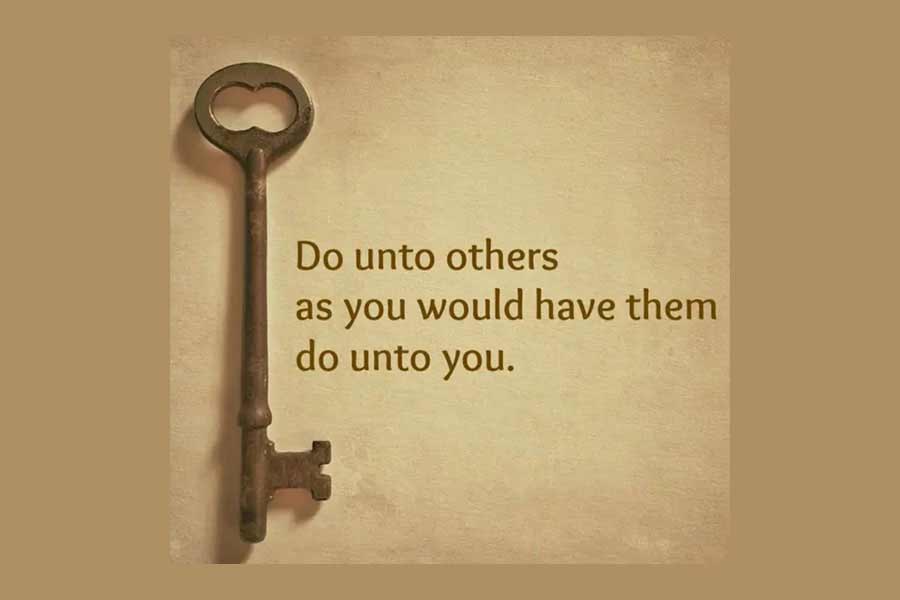
Published :
Updated :

'Do unto others as you would have them do unto you'. These are Biblical words defining ethical behaviour. But how they relate to life today? In this context I recall an experience of my younger years when I was working for a consulting house. It was about visiting a nearby city where we had a project. It would be a day trip and I was supposed to pick up my manager on way to the airport. It was early morning when I reached his house. The weather was inclement. He was not well and I had to fly alone. The job done; I returned the same day. I met him at the office and he looked ok. As I returned home that night I could not help thinking if my manager was really unwell or did not fly due to the inclement weather! There must be many such experiences in other people's lives with questioned ethical behaviour of supervisors. Arguments can be had on both sides considering factors that would override Biblical considerations such as the right of a mother to spank her child. Yet there are areas where logic as such would fail such as selling drugs that are known to be harmful to human health. The buyer can insist on his right to choose knowing fully well the consequences. But justification on the side of the seller would not be easy.
Life today is very different from the Biblical ages. Norms are broken to accommodate greater needs. For example homes, that were once considered castles away from the intrusion of work life. The networked computers and cellular phones, among other things, have now removed that distinction between the place of work and the place called home. A home still exists physically, as alluring as ever, but is no more 'a castle away from intrusion'. The segments of life - work, rest and leisure, have somehow merged into one. Success in life now requires one to integrate all these segments where work takes priority over other activity. One must accept this change to stay in the race of life. The consequence is a race that can turn an expert today into a nonentity because he has failed to keep up with the changes. A hard-earned qualification can easily turn into a non-qualification in a short time as societal needs get redefined. This is how some have defined the age today as the 'age of unreason'. It is a difficult time that gets more difficult with the passing days.
Productivity is a rave word in the corporate world today. The competitiveness of a nation is tied to the productivity, more output for given input. Thanks to this productivity race in the corporate today, the availability of goods and services has assumed an enormous proportion - more of everything with better designs and divergent uses. But where would one get so many buyers? This has been worsened by a situation where goods today are almost repair-free. Added to this is the dampening effect of smaller families of the developed nations where most purchasing power lies. To alleviate this situation, we now have a reconstituted equation of needs where one item of a kind is no longer enough for one household. How interesting, when you compare it to the now famous dialogue in the Spielberg classic 'Back to the future' that no home owns more than one television? The hungry consumer society has found an answer to the malaise of near perfection of the new age.
But there is a problem of different kind. It is not the dearth of options, but having too many of them. Consider the simple process of buying a smart phone. In so doing, the first thing that one does is to define the functions that it should have against the budget. With the homework done, if necessary, with some help, the next step is a trip to the shop and find a salesman to help with the choice. This is when the problem will start. The eager salesman is more likely to confuse you with buzzwords and a possible lecture on the options that you could avail against the budget, unless, of course, you would want to add a little extra to make you the proud owner of the equivalent of a Porsche. Against this background consider the prayer of the poor poet who would go back to the idylls of the woods leaving behind the insanity of city. I am not surprised. Yet, I would prefer the city!
The world today is very divided between people either having too much or too little. The Median has lost its relevance in finding a balanced position as there is no such group except in the Gini coefficient where it hovers around 0.5. That is where the problem begins as we see in most developing countries of the world today. Does it signal the beginning of very different social order that we are stepping into?
chowdhury.igc@gmail.com


 For all latest news, follow The Financial Express Google News channel.
For all latest news, follow The Financial Express Google News channel.